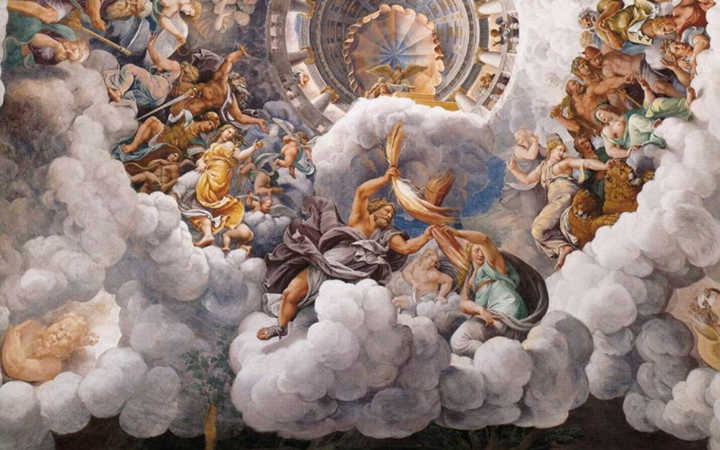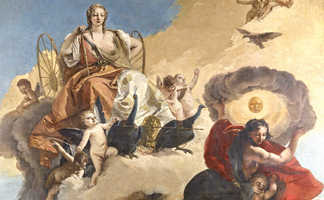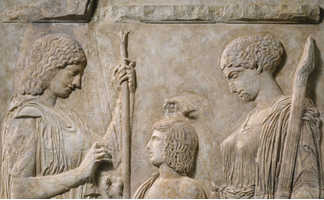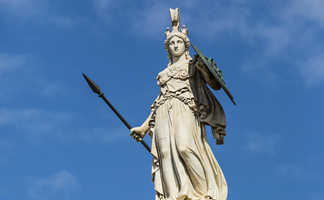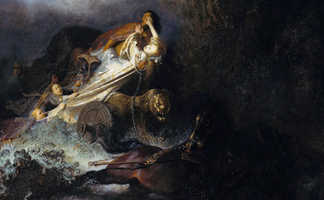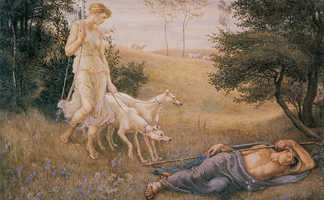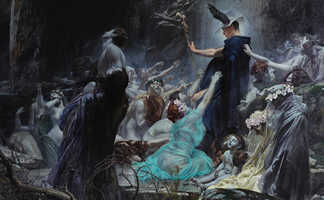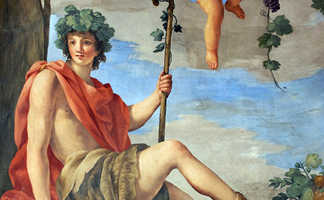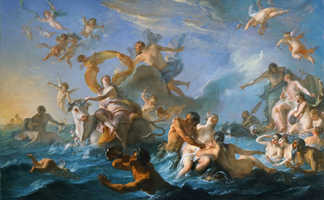To get an idea of how deeply the concept of the god Zeus permeates Western culture even to this day, ask the average person what the Christian God is like, and you’ll get an answer somewhere along the lines of, “An immensely powerful old man with a beard who throws lightning bolts from time to time.” Which is actually a fairly accurate general description of Zeus.
The God of Christianity, in contrast, is described in the Bible as a spirit: “God is spirit, and those who worship him must worship in spirit and in truth.” For the record, the Christian God never manifests as a man with a beard, young or old.
Like most other Greek gods, Zeus has his flaws. In the same way that a popular and otherwise skilled politician has a spectacular fall from grace because of an unseemly sex scandal by which he will always be remembered, Zeus’s claim to fame, despite all his immense power in his role as chief deity of the Olympians, is his propensity to seek sexual companionship outside the bounds of his marriage to Hera, his wife. This propensity, as is always the case, rewards him with untold grief all out of proportion the pleasures his dalliances provide.
Rebellion
Zeus starts out as an usurper, as his father, Cronus, was an usurper. This is noteworthy in that there seems to have always been a rather rebellious, uncooperative spirit in the Greek psyche. By and large, Greeks do not enjoy being told what to do, and will naturally rebel against even commands that are good for them. It often appears that rebellion is the Greek’s default attitude toward authority. Sometimes this attribute can be admirable, such as when the three hundred Spartans dared to stand up to the Persian hordes invading their homeland. But it also often leads to completely avoidable trouble.
At any rate, a rebellious spirit has a very long pedigree in Greece, stretching back to myths that are thousands of years old. Cronus, the father of Zeus, rebelled against his own father, Uranus, with the help of his mother Gaia, and became the chief deity of the Greek world. Before his downfall, however, Uranus prophesied that Cronus himself would be overthrown by one of his own offspring. And thus it came to be.
Cronus figured he could neutralize this prophecy by the simple yet gruesome expedient of swallowing his children whole as soon as they were born. Five times he did this. Rhea, Cronus’ wife, however, was getting a little tired of going through pregnancy and birth only to be cheated of the pleasures of motherhood. She finally outsmarted her husband by hiding in a cave in Crete, giving birth to Zeus there, and substituting the newborn for a stone wrapped in swaddling, which Cronus promptly swallowed whole. Zeus was then fostered on Crete by Amalthea, who was either a female goat, or a nymph, who fed him goat’s milk.
When he was of age, Zeus found his way to Cronus’ court, where he served as a cupbearer. Cronus was unaware of Zeus’s true identity. At the instigation of Rhea, who was still sore at Cronus for swallowing their children, Zeus the cupbearer gave Cronus an emetic which forced Cronus to disgorge the stone, then the five children he had swallowed. After that, Zeus led his rebellion against Cronus in the wars known as the Titanomachy, and established himself as ruler of the universe.
Disguises
As previously mentioned, Zeus may have been the all-powerful ruler, but, like most other gods, he could behave in all too human ways. Chiefly, he was an extravagant adulterer, and there is much comedic value in his disguising himself to have relations with desirable women, and his subsequent unmasking by his furiously jealous wife, Hera.
Here’s a short list of how Zeus disguised himself, and whom he desired:
Disguise: a bull. Desired: Europa, a Phoenician princess.
Zeus decided to either seduce or rape Europa. (There seems to be little distinction between the two, generally, in Greek mythology.) He transformed himself into a white bull, and mixed in with the herd of Europa’s father, Agenor, King of Tyre. Taken with his beauty, Europa went up to the tame bull, stroked his back, and mounted him. That’s when the bull plunged into the sea, swam to Crete, and, after revealing his true identity, ravished her and made her the first queen of Crete. She bore him three children. Her name eventually became the name of the European continent, and was first used as such in the 6th century, BC, by the philosopher Anaximander and the geographer Hecataeus.
Disguise: a swan. Desired: Leda, a Spartan queen.
Leda eventually gave birth to Helen with Zeus. (Other versions have Helen as the daughter of Nemesis, the goddess of disaster.) The story became the subject of various works of art, including a 15th century lost painting by Leonardo Da Vinci, a sculpture by 4th century BC sculptor Timotheos, and a 20th century poem by William Butler Yeats.
Disguise: a shower of gold. Desired: Danae, daughter and only child of Acrisius, king of Argos. King Acrisius went to Delphi and asked the oracle if he would ever father a son. The oracle’s answer was that he would not, but that his daughter would, and that that son would kill the king. So the king imprisoned his daughter in a doorless, windowless chamber. But she’d caught the eye of Zeus, who transformed himself into golden rain which came into the chamber through the roof and entered her womb. She then gave birth to the hero Perseus, great-grandfather of Hercules. Perseus eventually killed his grandfather.
Disguise: a satyr. Desired: Antiope, daughter of the river god Asopus.
In addition, Zeus’s other disguises include a flame of fire, the god Apollo, a cuckoo, and a goose.
In total, Zeus had seven wives, and somewhere in the neighborhood of eighty children, including high-level deities such as Apollo, Artemis, Persephone, Athena, Ares, and Hephaestus, and the hero Heracles.
Attributes and Epithets
Zeus is considered the all-powerful sky god, ruler of lightning, thunder, law and order. As a sort of chief executive, he assigned roles to other gods. His symbols are the thunderbolt, the eagle, the bull, and the oak.
The idea of Zeus has been through a number of permutations due to how historically old a deity he is. This is generally true of all the Greek gods. The genius of the Greek version of these gods, however, is that they became more human, and understandable to their worshippers. There are a number of epithets- phrases which describe someone’s character- attached to Zeus. Again, epithets are also attached to all of the major Greek deities.
Most of Zeus’s have to do with sky phenomena: thunder, lightning, and clouds. Homer calls him the “gatherer of clouds.” Herodotus says that the most sacred places of worship to Zeus are on mountaintops. As a side note, many of these mountaintop shrines have been replaced, in the Christian era, with shrines to the Old Testament prophet Elijah, who himself was famously taken up to heaven in a whirlwind and a chariot of fire in the book of 2 Kings.
Zeus is considered to be intimately involved in all of our affairs, and he “disposes of everything by his will,” according to the 7th century, BC poet Semonides of Amorgos. He is regarded as a protector, as well, and especially to socially excluded types, such as wanderers, strangers, visitors, and beggars.
Homer explains how this concept affected the way Greeks dealt with strangers in their midst. Princess Nausica, upon discovering the half-drowned, shipwrecked Odysseus in the Odyssey, commands that he be treated well, “since all strangers and beggars come under the protection of Zeus.”
Some epithets of Zeus include Zeus Polius, protector of population centers during civil strife or warfare, Zeus Soter, rescuer of victims of war and natural disasters. Zeus Xenios protected the guest and foreigner. Zeus Herkeios protected hearth and home, Zeus Ktesios, in the form of a snake protected property, Zeus Philios protected friendship, and Zeus Ombrios was the rain-giver and benefactor of farmers.
Festivals, the Olympic Games
Many festivals in ancient Greece had Zeus as their focal point. Athens held the yearly Diisoteria Festival celebrated Zeus and Athens’s roles as protectors of the city. In February, the more somber Zeus Meilichios Festival was held to appease Zeus’s connection to the Underworld and was celebrated privately, in households.
The greatest festival honouring Zeus was the quadrennial Olympiad. The Olympic games was a sporting event, but only within the context of a great religious festival to Zeus. The Altis Grove in Olympia, the Peloponnese, was the most sacred place of worship of Zeus in all of Greece. In the great temple to Zeus at Olympia was the 13 meter-high statue of Zeus, sculpted by the greatest sculptor in Greek history, Phidias, who also carved much of the statuary on the Acropolis. The statue was made of gold and ivory, and was so magnificent that it is listed as one of the seven wonders of the ancient world.
The most monumental ruins in downtown Athens are those of the Temple of the Olympian Zeus, with its fifteen still-standing, massive, seventeen meter-high Corinthian columns. That’s about as high as a five-story building. A sixteenth column, blown over by a fierce wind in 1852, still lies in segments on the ground.
The Oracle at Dodona
This oracle, in Epirus, northwestern Greece, was second in importance to that of Delphi for instruction and knowledge of ancient Greeks. These oracles provided a means of communication between men and gods. Zeus’s prophecies were handed down through the leaves of a holy oak tree at Dodoni, the oak being one of the symbols of Zeus. As was also the case in Delphi, prophecies were administered by on-site priestesses in a trance state.
Conclusion
Zeus is still worshipped today amongst a minority of modern Greeks. And every four years, the ceremony surrounding the lighting of the Olympic flame involves prayers to Zeus: “…And you, Zeus, give peace to all peoples on earth and wreath the winners of the sacred race.”
There are many, many myths associated with Zeus. He also played an important role in the Iliad, the story of the siege of Troy. Some of these myths will be dealt with in later posts.

